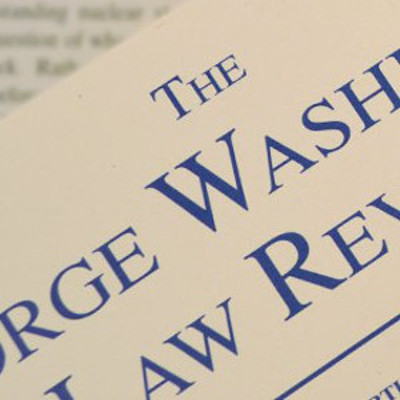Overseeing Agency Enforcement: A Foreword to the Annual Review of Administrative Law
Rachel E. Barkow · 84 Geo. Wash. L. Rev. 1129 · A big part of what agencies do—indeed, the core of their executive power—is law enforcement. Whether it is a statute or an agency regulation, agencies make sure that individuals and entities comply with the law. In the case of some agencies, such as prosecutors’ offices or police... Read More
A Risk-Based Approach to Limited Liability for Individuals and Corporate Parents
Dane P. Shikman 84 Geo. Wash. L. Rev. 1104 Corporate parents and individual shareholders are fundamentally different. In particular, they have different sensitivities to economic risks—yet the limited liability doctrine has failed to account for that difference. This Note argues the customary practice of mechanically applying a checklist of veil- piercing factors commonly favors corporate... Read More
Beyond Comparison: Practical Limitations of Implementing Comparative Juror Analysis in the Context of Sexual Orientation
Julia Haigney 84 Geo. Wash. L. Rev. 1075 Serving on a jury is an important civic duty. As such, the exclusion of potential jurors on the basis of their race, gender, or other discriminatory characteristics violates their rights under the Equal Protection Clause of the Fourteenth Amendment, according to Batson v. Kentucky and its progeny.... Read More
The Case for UDAAP-Based Credit Card Lending Regulations: Providing Greater Financial Security for America and American Consumers
Eric M. Aberg 84 Geo. Wash. L. Rev. 1029 In the lead up to the financial crisis of 2007–2009, federal banking regulators failed to keep large national banks in safe and sound condition while allowing them to engage in lending practices that exploited vulnerable consumers. Measures have been passed in recent years to reign in... Read More
Lenient in Theory, Dumb in Fact: Prison, Speech, and Scrutiny
David M. Shapiro 84 Geo. Wash. L. Rev. 972 The Supreme Court declared thirty years ago in Turner v. Safley that prisoners are not without constitutional rights: any restriction on those rights must be justified by a reasonable relationship between the restriction at issue and a legitimate penological objective. In practice, however, the decision has... Read More
Plea Bargaining and Price Theory
Russell D. Covey 84 Geo. Wash. L. Rev. 920 Like other markets, the plea bargaining market uses a pricing mechanism to coordinate market functions and to communicate critical information to participants, information that permits rational decisionmaking in the face of uncertainty. Because plea bargaining plays such a prominent role in the administration of criminal justice,... Read More
The Duty of Clarity
John O. McGinnis 84 Geo. Wash. L. Rev. 843 This Article shows that the Constitution contemplates that judges are to exercise a duty of clarity before declining to follow legislation because it violates the Constitution. That is, they were to exercise the power of judicial review only if the legislation at issue proved to be... Read More
Alumni Newsletter – Volume 85, Fall Edition
With our new team up and running at the Law Review, Volume 85 Editor-in-Chief, Amy Pearlman, has crafted this newsletter to keep our alumni community apprised of everything that’s happening at The George Washington Law Review, from student notes to leadership awards. Read the full newsletter here.
The Supreme Court Meets a Gridlocked Congress
Michael Ellement · July 2016 84 Geo. Wash. L. Rev. Arguendo 116 Congress is at a standstill—increasingly unable to agree on, or even debate, new legislation widely supported by the American public. This Essay explores congressional gridlock and its effect on the Supreme Court. It reviews recent decisions involving federal legislation, as well as statements by the Justices on... Read More
Domesticating the Alien Tort Statute
Michael L. Jones · July 2016 84 Geo. Wash. L. Rev. Arguendo 95 The Alien Tort Statute allows aliens to sue for violations of the law of nations. The statute does not specify whom the aliens are allowed to sue. There is not much history surrounding the statute, as it lay dormant for nearly two centuries. The... Read More

